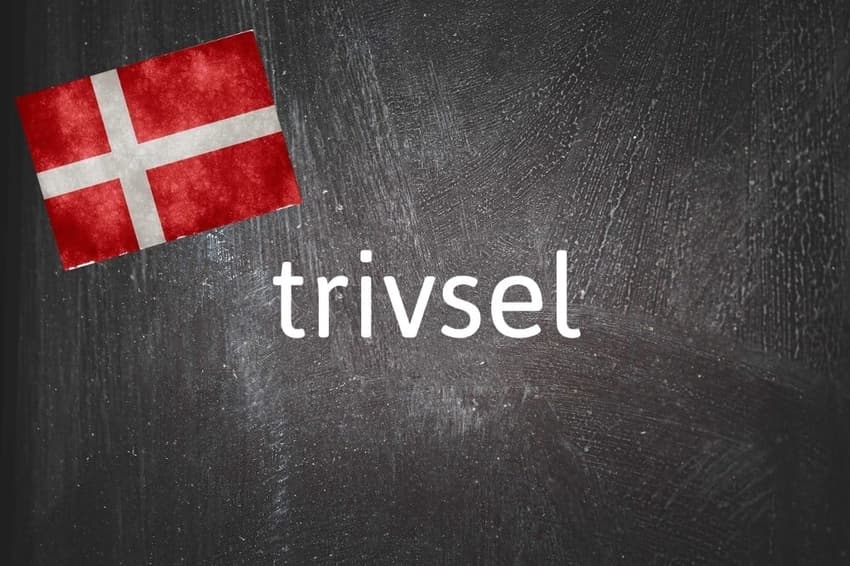Danish word of the day: Trivsel

Photo by Francesco Ungaro on Unsplash and Nicolas Raymond/FlickR
A word that expresses a feeling of well-being.
What is trivsel?
Trivsel is a noun which is difficult to pin to a direct English translation. It comes from the verb at trives, which is a little easier, meaning “to thrive”.
At trives is used in a broader range of situations than “thrive”, however. You can say han trives til fodbold (“he’s thriving at football practice”), but also han trives i sin nye skole.
This latter sentence literally means “he’s thriving at his new school” but doesn’t exactly mean “thriving” in the way you’d understand the word in English. As well as growing physically or mentally, trives can also mean to find yourself in a generally good situation, to feel at home in your surroundings or to be comfortable and able to develop in the work or school situation you are in.
So han trives i skolen doesn’t necessarily mean “he’s getting good marks and learning a lot at school”, although this may also be the case. Instead, it can mean something closer to “he likes his school and is happy to go there”.
Why do I need to know trivsel?
As the noun form of at trives, trivsel is normally used to describe the level of well-being of someone in a particular context. It’s common to hear it used about children and young people, but it’s not limited to that particular topic.
You might have read a sentence such as det er afgørende for børns trivsel, at man kan komme i skole og være sammen med klassekammerater (”it’s crucial for the well-being of children that they can come into school and see their classmates”) during the Covid-19 pandemic, when there was discussion about the impact of lockdowns on young people’s development and mental health.
The opposite of trivsel is mistrivsel. This is even harder to translate unless you just think of it as being an opposite. “Lack of well-being” or a “well-being deficit” loosely convey its meaning, and it can also just mean “feeling bad”.
Man risikerer mistrivsel blandt børn og unge, hvis skolerne bliver ved med at lukket på længere sigt is a negated way of saying the previous example sentence: ”You are at risk of damaging the well-being and development of children and young people if schools remain closed in the longer term”.
Comments
See Also
What is trivsel?
Trivsel is a noun which is difficult to pin to a direct English translation. It comes from the verb at trives, which is a little easier, meaning “to thrive”.
At trives is used in a broader range of situations than “thrive”, however. You can say han trives til fodbold (“he’s thriving at football practice”), but also han trives i sin nye skole.
This latter sentence literally means “he’s thriving at his new school” but doesn’t exactly mean “thriving” in the way you’d understand the word in English. As well as growing physically or mentally, trives can also mean to find yourself in a generally good situation, to feel at home in your surroundings or to be comfortable and able to develop in the work or school situation you are in.
So han trives i skolen doesn’t necessarily mean “he’s getting good marks and learning a lot at school”, although this may also be the case. Instead, it can mean something closer to “he likes his school and is happy to go there”.
Why do I need to know trivsel?
As the noun form of at trives, trivsel is normally used to describe the level of well-being of someone in a particular context. It’s common to hear it used about children and young people, but it’s not limited to that particular topic.
You might have read a sentence such as det er afgørende for børns trivsel, at man kan komme i skole og være sammen med klassekammerater (”it’s crucial for the well-being of children that they can come into school and see their classmates”) during the Covid-19 pandemic, when there was discussion about the impact of lockdowns on young people’s development and mental health.
The opposite of trivsel is mistrivsel. This is even harder to translate unless you just think of it as being an opposite. “Lack of well-being” or a “well-being deficit” loosely convey its meaning, and it can also just mean “feeling bad”.
Man risikerer mistrivsel blandt børn og unge, hvis skolerne bliver ved med at lukket på længere sigt is a negated way of saying the previous example sentence: ”You are at risk of damaging the well-being and development of children and young people if schools remain closed in the longer term”.
Join the conversation in our comments section below. Share your own views and experience and if you have a question or suggestion for our journalists then email us at [email protected].
Please keep comments civil, constructive and on topic – and make sure to read our terms of use before getting involved.
Please log in here to leave a comment.